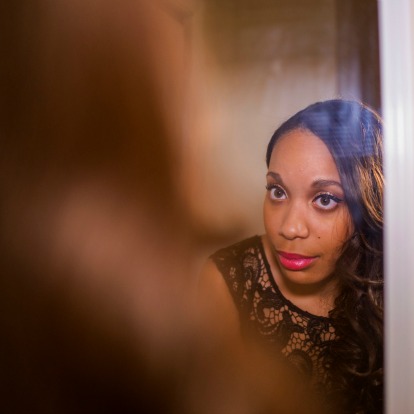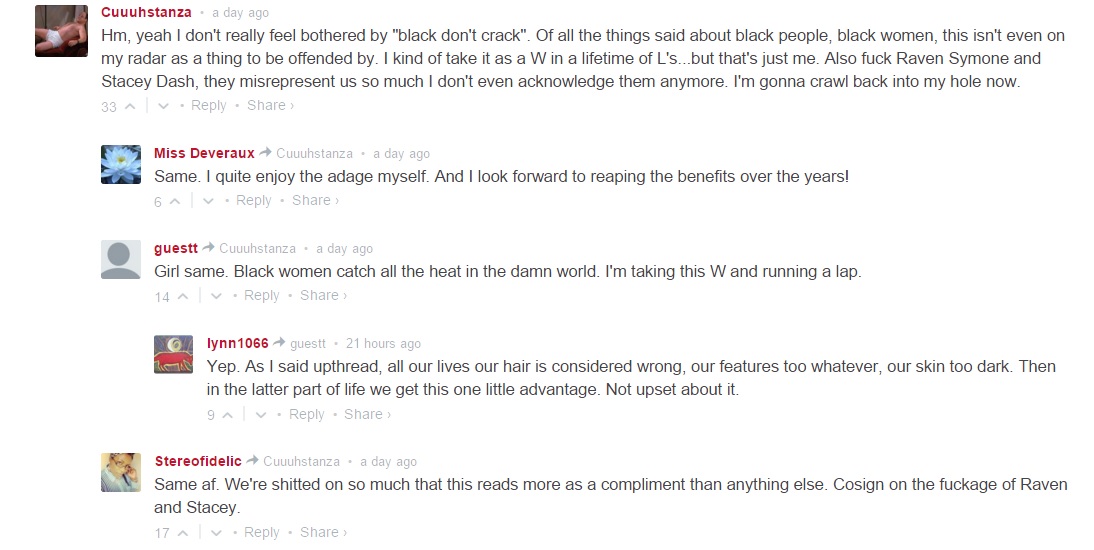I realize I gave my position on this subject away in the title, but I just couldn’t have y’all thinking for even a microsecond that I was about to make the saying “Black don’t crack” a thing. Well, the phrase already is a thing — a very factual thing actually — but I mean a thing in the sense of an overly-sensitive, racially-divisive, socially pressured mountain out of a mole hill thing.
That’s the best way I can sum up this piece by Pia Glenn on XOJane in which she states, “I Think I Might Be Done with People Saying “Black Don’t Crack!” Like It’s a Compliment. Why, whatever do you mean, dear?
Well, for starters Pia says this:
We know I’m all for celebration of Black women. If only the sentence above stopped there. It doesn’t; instead it is inextricably linked to favorable comparison against Others, (White women), and, for me, it’s beginning to hold more pressure than praise.
As is the case with so many compliments, some have trespassed from the sweet spot of building one group up purely to praise them, and landed firmly in the territory of tearing someone else down in elevating another. So when “Black don’t crack” becomes just another way to pit women against each other, you can leave me out of it.
Fair. I’m not here for pitting women against one another either (though in the interest of full disclosure I must admit the site has run some of those “can you believe these women are the same age?” slideshows Pia criticized in her piece. Sorry! We’ll do better). However, why does acknowledging the universe/God/science/whomever gave Black women the upper hand on the elasticity front automatically mean non-Black women are being torn down? That notion just gave me #AllLivesMatter feels and that type of privileged sensitivity I just can’t support. If me acknowledging the youthfulness of 91-year-old Cicely Tyson makes 90-year-old Barbara Bush feel some type of way, the latter is just going to have to get out of her feelings and take that matter up with the man above. You can celebrate one group of people’s genetics without it being a personal affront to another’s — or at least you should be able to. And on that same note, I do agree with Pia when she says she doesn’t receive this “compliment” well from the lips of a white woman as it seems to “stem from a combination of acknowledging one’s own ‘inferiority,’ and wild assumptions and sweeping generalizations.” In short, she writes, “It just ends up feeling oddly… othering,” and that, I agree, is very true.
Pia then goes on to talk about the unfortunate way in which criticisms of Raven-Symoné and Stacey Dash are often framed by snark remarks about the aging process starting to catch up to them versus discussing their ill-contrived practice of dancing for the white man head on — a point I agree with but feel is an entirely different discussion altogether. Plus I refuse to devote too much time to defending either one of these women who would be just fine if me and my oddly spelled name were unemployed or continued to make 78 cents on the dollar until the day I die.
I think the most honest point about Pia’s issue with the saying “Black don’t crack” is made when she acknowledges, “ultimately, like so many other things in our lives, my fears and reservations about this are rooted in personal discomfort and insecurity. Some would say that my black don’t crack, and I’m someone who hears that not as a compliment, but as pressure. Pressure to look a certain way and to continue to look a certain way, even as the pages of the calendar fly by in rapid succession.” I don’t mean to be curt, but that’s a personal problem.
Yes, we all have the right to tell people the manner in which we want to be spoken to and about, but there also has to be some level of discernment when we get our panties in a bunch. If someone (of color for reasons noted above) were to find out your real age and say to you “Black don’t crack,” ask yourself, do they mean something malicious by this? Do they know they’re setting off ageist insecurities in my mind? Or are they paying me a compliment because they thought I was really 10 years younger? More often than not, the latter explanation is where you’ll find the truth.
For the past few years I’ve joked about how when I used to tell people my age it was always met with, “you’re so young!” and ever since I turned 27 and up that comment stopped coming. It’s a funny thing I acknowledged but it doesn’t make me feel any type of way because I know 30 is still young. And even if it wasn’t, I’d still be happy to be alive and living well. I’m actually much more amused by the fact that the very same week I became obsessed with the dark circles I think are beginning to form under my eyes — and subsequently went on a hunt for an eye cream that costs the same amount as my age — four different people in my same age bracket hit me with a “you may be too young to remember this” line, thinking I was only 25 or 26. My melanin is already being good to me and I won’t dismiss that scientifically factual blessing just so a 30-year-old white girl will put off Botox.
There are a lot of ways in which women need to stop comparing themselves to one another and the media needs to stop pitting us against each other, dropping the phrase “Black don’t crack” isn’t one of them. And if you didn’t have the time to read my whole diatribe explaining why, just know I fully agree with the comments left by these XOJane readers.











